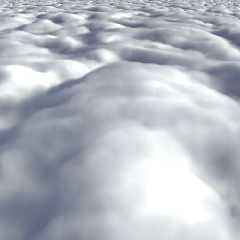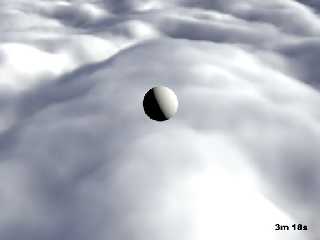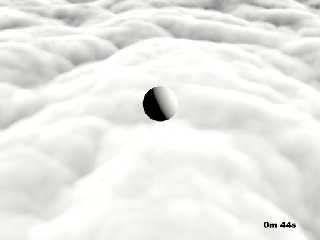 |
 |
|
 |
|
 |
|  |
|  |
|
 |
|
 |
|  |
|  |
|
 |
Hello everyone! Here's an idea I've been thinking of for quite a while.
I'm pretty sure somebody has done something like this before... it might
have been a grass texture, though.
What you see is actually a flat plane layered with over eighty
semitransparent textures. Each additional texture is scaled slightly
larger than the last, and uses a slightly altered color_map (actually a
pigment_map, but it doesn't really need to be one anymore). The texture
is then translated to the camera's X & Z coordinates to achieve a more
proper illusion.
I can't really see a practical application for this trick. Even though
this image rendered in a little over five minutes, it can get very slow
when antialiasing is applied :( Also, POV-Ray tends to throw an error
if the number of texture layers goes over 100.
I still have yet to try it with radiosity. There's no reason why it
shouldn't work.
The code has been placed (a little too hastily) to
povray.binaries.scene-images.
Questions and comments are always welcome-
-Samuel Benge
Post a reply to this message
Attachments:
Download 'fake_elevation.jpg' (35 KB)
Preview of image 'fake_elevation.jpg'

|
 |
|  |
|  |
|
 |
|
 |
|  |
|  |
|
 |
Samuel Benge wrote:
> I can't really see a practical application for this trick. Even though
> this image rendered in a little over five minutes, it can get very slow
> when antialiasing is applied :(
Update:
I just tried it again with antialising, and the render time didn't
really go up that much. Evidently, the last time I tried aa the texture
had a lot of noise in it. Also, removing the surface normal considerably
decreases render time.
I attached two more images. The first one has the surface normal in
place and uses aa. The second uses no surface normal, but still has aa.
The render times are diplayed in the lower right corner of each image.
-Samuel Benge
Post a reply to this message
Attachments:
Download 'fake_ev1.jpg' (15 KB)
Download 'fake_ev2.jpg' (16 KB)
Preview of image 'fake_ev1.jpg'

Preview of image 'fake_ev2.jpg'

|
 |
|  |
|  |
|
 |
From: Roberto Amorim
Subject: Re: More Faked Volumetrics Update (31k total, 2 jpegs)
Date: 8 Apr 2004 15:51:48
Message: <4075ad54@news.povray.org>
|
|
 |
|  |
|  |
|
 |
> I attached two more images. The first one has the surface normal in
> place and uses aa. The second uses no surface normal, but still has aa.
> The render times are diplayed in the lower right corner of each image.
Number two looks better (IMHO) and renders faster. Looks like a winner to
me.
Nice technique, BTW.
Regards!
Post a reply to this message
|
 |
|  |
|  |
|
 |
|
 |
|  |
|  |
|
 |
Uzytkownik "Samuel Benge" <stb### [at] hotmail com> napisal w wiadomosci
news:407### [at] hotmail com> napisal w wiadomosci
news:407### [at] hotmail com...
> Hello everyone! Here's an idea I've been thinking of for quite a while.
> I'm pretty sure somebody has done something like this before... it might
> have been a grass texture, though.
>
> What you see is actually a flat plane layered with over eighty
> semitransparent textures. Each additional texture is scaled slightly
> larger than the last, and uses a slightly altered color_map (actually a
> pigment_map, but it doesn't really need to be one anymore). The texture
> is then translated to the camera's X & Z coordinates to achieve a more
> proper illusion.
>
> I can't really see a practical application for this trick. Even though
> this image rendered in a little over five minutes, it can get very slow
> when antialiasing is applied :( Also, POV-Ray tends to throw an error
> if the number of texture layers goes over 100.
It may come handy at rendering backdrops to aerial scenery (e.g. a flying
aeroplane).
>
> I still have yet to try it with radiosity. There's no reason why it
> shouldn't work.
>
> The code has been placed (a little too hastily) to
> povray.binaries.scene-images.
>
> Questions and comments are always welcome-
>
> -Samuel Benge
>
Respectfully
Matt
----------------------------------------------------------------------------
---- com...
> Hello everyone! Here's an idea I've been thinking of for quite a while.
> I'm pretty sure somebody has done something like this before... it might
> have been a grass texture, though.
>
> What you see is actually a flat plane layered with over eighty
> semitransparent textures. Each additional texture is scaled slightly
> larger than the last, and uses a slightly altered color_map (actually a
> pigment_map, but it doesn't really need to be one anymore). The texture
> is then translated to the camera's X & Z coordinates to achieve a more
> proper illusion.
>
> I can't really see a practical application for this trick. Even though
> this image rendered in a little over five minutes, it can get very slow
> when antialiasing is applied :( Also, POV-Ray tends to throw an error
> if the number of texture layers goes over 100.
It may come handy at rendering backdrops to aerial scenery (e.g. a flying
aeroplane).
>
> I still have yet to try it with radiosity. There's no reason why it
> shouldn't work.
>
> The code has been placed (a little too hastily) to
> povray.binaries.scene-images.
>
> Questions and comments are always welcome-
>
> -Samuel Benge
>
Respectfully
Matt
----------------------------------------------------------------------------
----
Post a reply to this message
|
 |
|  |
|  |
|
 |
|
 |
|  |
|  |
|
 |
Samuel Benge wrote:
> Hello everyone! Here's an idea I've been thinking of for quite a while.
> I'm pretty sure somebody has done something like this before... it might
> have been a grass texture, though.
<snip:technical />
BRILLIANT idea! It may cause some challenges for the renderer if objects
are within those planes. Have you found any trouble with, say, a
sphere in the middle of the clouds?
--
Respectfully,
Dan P
http://<broken link>
Post a reply to this message
|
 |
|  |
|  |
|
 |
|
 |
|  |
|  |
|
 |
Samuel Benge nous apporta ses lumieres ainsi en ce 2004/04/08 15:33... :
> Samuel Benge wrote:
>
>> I can't really see a practical application for this trick. Even
>> though this image rendered in a little over five minutes, it can get
>> very slow when antialiasing is applied :(
>
>
>
> Update:
> I just tried it again with antialising, and the render time didn't
> really go up that much. Evidently, the last time I tried aa the
> texture had a lot of noise in it. Also, removing the surface normal
> considerably decreases render time.
>
> I attached two more images. The first one has the surface normal in
> place and uses aa. The second uses no surface normal, but still has
> aa. The render times are diplayed in the lower right corner of each
> image.
>
> -Samuel Benge
>
>
>
>
> ------------------------------------------------------------------------
>
>
> ------------------------------------------------------------------------
>
Second one looks beter for a flyby over some clouds, the first should be
beter for a snowy field. For me anyway.
Alain
Post a reply to this message
|
 |
|  |
|  |
|
 |
|
 |
|  |
|  |
|
 |
In article <4075d862$1@news.povray.org>,
Dan P <dan### [at] yahoo com> wrote:
> BRILLIANT idea! It may cause some challenges for the renderer if objects
> are within those planes. Have you found any trouble with, say, a
> sphere in the middle of the clouds?
Well, since it's on a 2D surface, it'd look a bit odd...
BTW, I vaguely recall some very good sky_sphere pigments done using this
technique. One advantage there is that you don't have any intersection
or finish/normal calculations, so it renders faster. The layered pigment
feature of sky_spheres seems to be overlooked far too much.
--
Christopher James Huff <cja### [at] earthlink com> wrote:
> BRILLIANT idea! It may cause some challenges for the renderer if objects
> are within those planes. Have you found any trouble with, say, a
> sphere in the middle of the clouds?
Well, since it's on a 2D surface, it'd look a bit odd...
BTW, I vaguely recall some very good sky_sphere pigments done using this
technique. One advantage there is that you don't have any intersection
or finish/normal calculations, so it renders faster. The layered pigment
feature of sky_spheres seems to be overlooked far too much.
--
Christopher James Huff <cja### [at] earthlink net>
http://home.earthlink.net/~cjameshuff/
POV-Ray TAG: <chr### [at] tag net>
http://home.earthlink.net/~cjameshuff/
POV-Ray TAG: <chr### [at] tag povray povray org>
http://tag.povray.org/ org>
http://tag.povray.org/
Post a reply to this message
|
 |
|  |
|  |
|
 |
|
 |
|  |
|  |
|
 |
Christopher James Huff wrote:
> In article <4075d862$1@news.povray.org>,
> Dan P <dan### [at] yahoo com> wrote:
>
>
>>BRILLIANT idea! It may cause some challenges for the renderer if objects
>> are within those planes. Have you found any trouble with, say, a
>>sphere in the middle of the clouds?
>
>
> Well, since it's on a 2D surface, it'd look a bit odd...
>
> BTW, I vaguely recall some very good sky_sphere pigments done using this
> technique. One advantage there is that you don't have any intersection
> or finish/normal calculations, so it renders faster. The layered pigment
> feature of sky_spheres seems to be overlooked far too much.
I misunderstood what he did; I thought he used many planes with seperate
transparent image_maps. I should have looked at the source; my bad.
--
Respectfully,
Dan P
http://<broken link> com> wrote:
>
>
>>BRILLIANT idea! It may cause some challenges for the renderer if objects
>> are within those planes. Have you found any trouble with, say, a
>>sphere in the middle of the clouds?
>
>
> Well, since it's on a 2D surface, it'd look a bit odd...
>
> BTW, I vaguely recall some very good sky_sphere pigments done using this
> technique. One advantage there is that you don't have any intersection
> or finish/normal calculations, so it renders faster. The layered pigment
> feature of sky_spheres seems to be overlooked far too much.
I misunderstood what he did; I thought he used many planes with seperate
transparent image_maps. I should have looked at the source; my bad.
--
Respectfully,
Dan P
http://<broken link>
Post a reply to this message
|
 |
|  |
|  |
|
 |
|
 |
|  |
|  |
|
 |
Christopher James Huff wrote:
> BTW, I vaguely recall some very good sky_sphere pigments done using this
> technique. One advantage there is that you don't have any intersection
> or finish/normal calculations, so it renders faster. The layered pigment
> feature of sky_spheres seems to be overlooked far too much.
Looks like something I'll have to try. Thanks.
-Samuel Benge
Post a reply to this message
|
 |
|  |
|  |
|
 |
|
 |
|  |
|  |
|
 |
"Samuel Benge" <stb### [at] hotmail com> wrote in message
news:407### [at] hotmail com> wrote in message
news:407### [at] hotmail com...
> I can't really see a practical application for this trick. Even though
> this image rendered in a little over five minutes, it can get very slow
> when antialiasing is applied :( Also, POV-Ray tends to throw an error
> if the number of texture layers goes over 100.
>
> -Samuel Benge
>
*drool* Practical applications are overrated and can alwasy come later :)
this alone is cool. com...
> I can't really see a practical application for this trick. Even though
> this image rendered in a little over five minutes, it can get very slow
> when antialiasing is applied :( Also, POV-Ray tends to throw an error
> if the number of texture layers goes over 100.
>
> -Samuel Benge
>
*drool* Practical applications are overrated and can alwasy come later :)
this alone is cool.
Post a reply to this message
|
 |
|  |
|  |
|
 |
|
 |
|  |




![]()